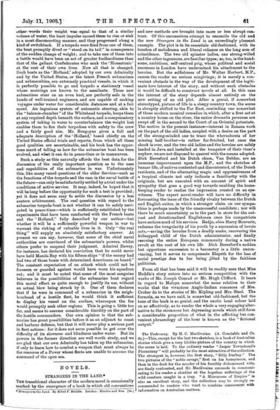NOVELS.
STRANGERS IN THE LAND.*
Tat transitional character of the modern novel is occasionally marked by the emergence of a book in which old conventions
• Strangersix the land. By Ethel F. Heddle. Loudon: Bl.tekie and Son. [68..1
and new methods are brought into more or less abrupt con- trast. Of this unconscious attempt to reconcile the old and the new Strangers in the Land is an exceedingly pleasant example. The plot is in its essentials old-fashioned, with its touches of melodrama and liberal reliance on the long arm of coincidence. The two old spinster ladies, one strong-willed and the other ingenuous, are familiar types; so, too, is the hand- some, ambitious, self-centred prig, whose political and social successes in London have undermined his attachment to the heroine. But the selfishness of Mr. Walter Herbert, M.P., causes the reader no serious misgivings ; it is merely a con- venient obstacle in the way of the development of the legiti- mate love interest of the story, and without such obstacles it would be difficult to construct novels at all. In this case the interest of the story depends almost entirely on the new setting of an old plot. After a genial, if somewhat stereotyped, picture of life in a sleepy country town, the soene is abruptly shifted to the Far East, reminding one somewhat of those modern musical comedies in which, after a first act at a country house on the river, the entire dramatis personas are swept off in the second to the Court of an Oriental potentate. The motive in the present instance—interest in Zenana work on the part of the old ladies, coupled with a desire on the part of the strong-minded one to trace the whereabouts of her missing half-brother—is rather far-fetched, but once the shock is over, and the two old ladies and the heroine are safely landed in Java and installed at the bungalow of their vicar's nephew, we are not disposed to quarrel with the means adopted. Dick Beresford and his Dutch chum, Van Delden, are an immense improvement upon the M.P., and the sketches of bazaar life, of natives contented and discontented, of the Dutch residents, and of the alternating magic and oppressiveness of a tropical climate not only indicate a familiarity with the originals, but are executed with an amount of spirit and sympathy that goes a good way towards enabling the home- keeping reader to realise the impression created on an eye- witness. The expert novel-reader will have no difficulty in forecasting the issue of the friendly rivalry between the Dutch and English suitor, in which a stronger claim on our sympa- thies is perhaps made by the unsuccessful candidate ; nor will there be much uncertainty as to the part in store for the out- cast and denationalised Englishman once his compatriots have serious need of his services. Redjo, alias Harry Bouverie, redeems the irregularity of his youth by a succession of heroic acts,—saving the heroine from a deadly snake, recovering the kidnapped child of the Dutch administrator, and finally rescuing the entire European community during a native revolt at the cost of his own life. Dick Beresford's sudden but opportune succession to a baronetcy is a little uncon- vincing, but it serves to compensate Elspeth for the loss of social prestige due to her being jilted by the faithless politician.
From all that has been said it will be readily seen that Miss Heddle's story enters into no serious competition with the works of Mr. Joseph Conrad or Mr. Hugh Clifford. It bears in regard to Malaya somewhat the same relation to their' works that the vivacious Anglo-Indian romances of Mrs. Croker do to the stories of Mr. Kipling and Mrs. Steel. The formula, as we have said, is somewhat old-fashioned, but the tone of the book is so genial, and the exotic local colour laid on so effectively, as to render the whole a very engaging alter- native to the strenuous but depressing novels which still form a considerable proportion of what in the afflicting but con- venient phraseology of the hour is known as the " fictional output."






































 Previous page
Previous page